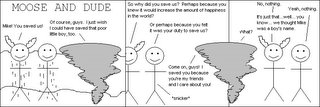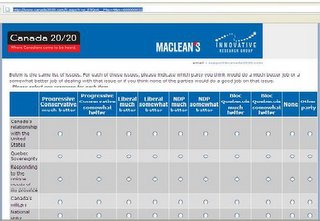Yesterday
I posted on the new Tory policy of getting tough on drugs. On mandatory minimum sentences, and on not moving toward the "Liberal" policy of decriminalization of marijuana, or the "NDP" policy of legalizing it. I complained that legalization should be less associated with the NDP, than with the policy minds that are supposed to influence Conservative policy and opinion. The Fraser Institute, the Senate Committee, and so on.
No policy is more likely to rankle me than this one. To be sure, I support gay marriage, and think that this is a policy worthy of aggressive defence also, but the drug issue is more serious to me, since honest and intelligent policy advice is resoundingly in favour of legalization, and since the lives destroyed by this policy count in the millions. It is a disaster on a scale of massive proportion.
And this is coming from me, a fellow who doesn't smoke pot (tried it about five times), has never done other drugs, and would ground with impunity any son or daughter of mine who dabbled in anything more serious than marijuana and its derivatives (I really believe that marijuana is harmless, and is probably sometimes good for you. But that's another issue, for another time.)
Some time in the not-too-distant future, you will agree with me. Unless your fanaticism borders on the religious, the daily deluge of policy papers, academic scribblings, op-eds, medical journal findings, and public opinion polls which all point in a similar direction is bound to have an effect on you. If not today, then tomorrow. And if not tomorrow, then a week or month from now. And if you still think it a good idea to incarcerate pot smokers and growers twenty years from now, you will change your mind twenty years later. But the longer it takes for you to change your mind, the longer will this disaster of a policy continue. The longer will we have to put up with lives utterly ruined and destroyed by this policy.
This post is aimed at small- and big-c conservatives. At those who are conservative philosophically, and those who support the political party. It is not really intended for anyone else, since the authorities I cite, and the instances I give are tailored to convince conservatives, not liberals, socialists, and so on.
Thoughtful and intelligent conservatives agree that the war on drugs is a lost cause, and the source of a massive amount of injustice, crime, and loss of life (in both the literal, and figurative sense).
Milton Friedman, a hero to most conservatives, not only thinks the War on Drugs is a failure, he thinks it is immoral. When I asked him, citing a 1972 Newsweek article where he supported the legalization of drugs, if he still felt this way, his response was an unequivocal "Absolutely!" Hard drugs too?, I asked. "Absolutely." What about ethics?:
PJ: Now you also said in that same article that this was an ethical issue as well.
MF: Absolutely—I've just said it—what right does the government have to tell me what I may put in my mouth? If the government has the right to tell me what I may put in my mouth, why doesn't it have the right to tell me what I may put in my mind? There is, in my opinion, no government policy that is as immoral as drug prohibition...
(Friedman and Freedom, March 15, 2002)
Friedman headlined a list of
500 economists who supported a Marijuana Policy Project report, written by Jeffrey Miron of Harvard, urging American legislators to legalize marijuana. You might recognize some of these as heroes, too. The report says:
"The report shows that marijuana legalization -- replacing prohibition with a system of taxation and regulation -- would save $7.7 billion per year in state and federal expenditures on prohibition enforcement and produce tax revenues of at least $2.4 billion annually if marijuana were taxed like most consumer goods. If, however, marijuana were taxed similarly to alcohol or tobacco, it might generate as much as $6.2 billion annually. The fact that marijuana prohibition has these budgetary impacts does not by itself mean prohibition is bad policy. Existing evidence, however, suggests prohibition has minimal benefits and may itself cause substantial harm."
(Budgetary Implications of Marijuana Prohibition, June, 2005)
But Friedman, strictly speaking, is a libertarian, not a conservative. Although he's a hero to both, you might think of him as being only conservative by overlap. Would you say the same of the
National Review? You probably have the magazine bookmarked, if you're a Canadian Tory. Here is the hallmark publication of the conservative movement proper. No chance of finding many libertarians sympathetic to this magazine, which is more likely to spit on libertarians as make common cause with them. But they don't spit so much when it comes to drugs. Instead, they support legalization:
"...it is our judgment that the war on drugs has failed, that it is diverting intelligent energy away from how to deal with the problem of addiction, that it is wasting our resources, and that it is encouraging civil, judicial, and penal procedures associated with police states. We all agree on movement toward legalization, even though we may differ on just how far."
(War on drugs is lost, Feb. 12, 1996)
Was the good ship S.S.
NR rudderless? Was William F. Buckley, the founder and steerer, in the background pulling his hair as his editorial board veers away from his considered judgment? Was Buckley outvoted on the issue, and the magazine presented an opinion vastly different from his? Not so. Here's Buckley himself:
"I leave it at this, that it is outrageous to live in a society whose laws tolerate sending young people to life in prison because they grew, or distributed, a dozen ounces of marijuana. I would hope that the good offices of your vital profession would mobilize at least to protest such excesses of wartime zeal, the legal equivalent of a My Lai massacre. And perhaps proceed to recommend the legalization of the sale of most drugs, except to minors."
(Ibid, a speech before the NY Bar Association)
The Economist doesn't flinch from the subject. The magazine most likely to be found on the shelves of intelligent conservatives and libertarians (amongst a host of others who are serious about economics) agrees: The War on Drugs is a bad idea.
"The best answer is to move slowly but firmly to dismantle the edifice of enforcement. Start with the possession and sale of cannabis and amphetamines, and experiment with different strategies... Move on to hard drugs, sold through licensed outlets. These might be pharmacies or, suggests Ethan Nadelmann, director of the Lindesmith Centre, mail-order distributors...
"John Stuart Mill was right. Over himself, over his own body and mind, the individual is sovereign. Trade in drugs may be immoral or irresponsible, but it should no longer be illegal."
(Set it free, July 26, 2001)
Meanwhile, here in Canada, the newspapers conservatives are most likely to subscribe to urge legalization. The
National Post has issued at least two editorials in favour of legalization. One, simply titled "Time to Legalize Pot," says:
"Marijuana legalization has long been the subject of academic debate. The time has come to turn conjecture into law. Canada's police, judges and prosecutors have better things to do with their time than track down those who produce and consume a substance no more dangerous than alcohol and tobacco. We should begin the decriminalization of marijuana by immediately reducing the punishments that can be imposed for its possession to modest fines -- and start thinking about how to regulate its use."
(Time to Legalize Pot, April 1, 2000)
And
here's a snippet from "Pointless Prohibition":
"The only sensible course of action is to end the pointless prohibition of a substance that is neither more dangerous nor more addictive than alcohol or tobacco, and one that has reportedly been smoked by more than 10 million Canadians at some point in their lives... It's time to make official what Vancouver's authorities have evidently already accepted, and legalize marijuana." (Pointless Prohibition, Sep. 7, 2004)
The Ottawa Citizen, another staple in the conservative newspaper diet, ran a series of four editorials urging an end to the war on drugs. Here are some excerpts:
"Too often, our political culture equates legalizing drugs with being soft on criminals. But it is criminalization, not legalization, that guarantees wealth and power for gangs and pushers. We will argue Monday that it need not be this way."
(Decriminalizing Drugs, April 12, 1997)
How appropriate is this first line in light of the recent Tory announcement about drugs?... Here's more:
"The recent history of drug enforcement, both in Canada and the United States, is largely a record of failure. Tax dollars are lavished on enforcement. Police powers are expanded at the expense of civil liberties. Criminal gangs grow richer. And drug use goes on regardless."
(Decriminalizing Drugs II, April 14, 1997)
More:
"But people constantly engage in any number of activities that, like drug use, physically endanger only themselves but risk inflicting emotional trauma on others should something go wrong: scuba diving, skiing, driving Highway 401. Others may be traumatized when sons marry outside the family religion, daughters form sexual relationships with other women, or parents divorce. With harm stretched beyond its original, liberal meaning, almost any activity that attracted a vociferous lobby group and applause-seeking politicians could be outlawed. If we are to have a free society in any meaningful sense, J.S. Mill's great liberal maxim must be re-invigorated, but with the original, narrow definition of harm intact. And Canada, secure in the knowledge of what is right in a free society, should allow its citizens to make their own decisions about whether or not to use drugs."
(Decriminalizing Drugs III, April 15, 1997)
And in the conclusion of the 4-part series, the
Ottawa Citizen puts nails in what should have been a coffin:
"The history of drug use confirms that we will never live in a drug-free society: Too many people inevitably just say yes. But we can have a society in which the worst effects of drug addiction are minimized, and those who are addicted are helped. We can have a society where mafia and biker gangs are not made rich and powerful by the ban on drugs.
Most importantly, we can have a society where the criminal law reflects not expediency and prejudice but principle. We can work toward a society clearly and consistently founded on the great liberal maxim of John Stuart Mill, that: "The individual is not accountable to society for his actions, insofar as these concern the interests of no person but himself.""
(Decriminalizing Drugs IV, April 16, 1997)
Stephen Easton, writing a Fraser Institute policy paper, thinks the enemy (drugs) has won. That's right, the Fraser Institute, Canada's most important free market think tank, the place most likely to draw the smartest and best conservatives (and libertarians) in this country.
“If we treat marijuana like any other commodity we can tax it, regulate it, and use the resources the industry generates rather than continue a war against consumption and production that has long since been lost... It is apparent that we are reliving the experience of alcohol prohibition of the early years of the last century.”
(BC's marijuana crop worth over 7 billion annually, June 9, 2004)
The Cato Institute has many friends in conservative circles. But they have been fierce on the issue. They support the legalization of all drugs. They've issued plenty of policy documents, but I will cite just one:
"By now, there can be little doubt that most, if not all, "drug-related murders" are the result of drug prohibition. The same type of violence came with the Eighteenth Amendment's ban of alcohol in 1920. The murder rate rose with the start of Prohibition, remained high during Prohibition, and then declined for 11 consecutive years when Prohibition ended.[2] The rate of assaults with a firearm rose with Prohibition and declined for 10 consecutive years after Prohibition. In the last year of Prohibition--1933--there were 12,124 homicides and 7,863 assaults with firearms; by 1941 these figures had declined to 8,048 and 4,525, respectively... In spite of the greatest anti-drug enforcement effort in U.S. history, the drug problem is worse than ever. What should be done now?... The status quo is intolerable--everyone agrees on that. But there are only two alternatives: further escalate the war on drugs, or legalize them. Once the public grasps the consequences of escalation, legalization may win out by default."
(Thinking about drug legalization, May 25, 1989)
There's plenty more where that came from.
In a subsequent post, I will expand on the second sense of the title of this post (yup, it's a double entendre).
Still think the war on drugs is a good idea? You swim against the tide of considered conservative opinion, my friend.
Soon, you'll be swimming alone.









